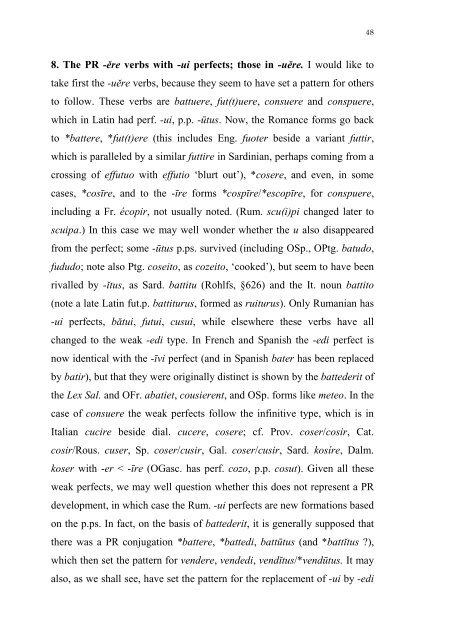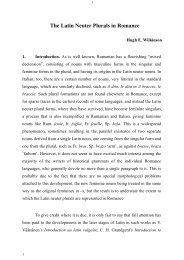THE STRONG PERFECTS IN THE ROMANCE ... - Page ON
THE STRONG PERFECTS IN THE ROMANCE ... - Page ON
THE STRONG PERFECTS IN THE ROMANCE ... - Page ON
Create successful ePaper yourself
Turn your PDF publications into a flip-book with our unique Google optimized e-Paper software.
8. The PR -ĕre verbs with -ui perfects; those in -uĕre. I would like to<br />
take first the -uĕre verbs, because they seem to have set a pattern for others<br />
to follow. These verbs are battuere, fut(t)uere, consuere and conspuere,<br />
which in Latin had perf. -ui, p.p. -ūtus. Now, the Romance forms go back<br />
to *battere, *fut(t)ere (this includes Eng. fuoter beside a variant futtir,<br />
which is paralleled by a similar futtire in Sardinian, perhaps coming from a<br />
crossing of effutuo with effutio ‘blurt out’), *cosere, and even, in some<br />
cases, *cosīre, and to the -īre forms *cospīre/*escopīre, for conspuere,<br />
including a Fr. écopir, not usually noted. (Rum. scu(i)pi changed later to<br />
scuipa.) In this case we may well wonder whether the u also disappeared<br />
from the perfect; some -ūtus p.ps. survived (including OSp., OPtg. batudo,<br />
fududo; note also Ptg. coseito, as cozeito, ‘cooked’), but seem to have been<br />
rivalled by -ĭtus, as Sard. battitu (Rohlfs, §626) and the It. noun battito<br />
(note a late Latin fut.p. battiturus, formed as ruiturus). Only Rumanian has<br />
-ui perfects, bătui, futui, cusui, while elsewhere these verbs have all<br />
changed to the weak -edi type. In French and Spanish the -edi perfect is<br />
now identical with the -īvi perfect (and in Spanish bater has been replaced<br />
by batir), but that they were originally distinct is shown by the battederit of<br />
the Lex Sal. and OFr. abatiet, cousierent, and OSp. forms like meteo. In the<br />
case of consuere the weak perfects follow the infinitive type, which is in<br />
Italian cucire beside dial. cucere, cosere; cf. Prov. coser/cosir, Cat.<br />
cosir/Rous. cuser, Sp. coser/cusir, Gal. coser/cusir, Sard. kosíre, Dalm.<br />
koser with -er < -īre (OGasc. has perf. cozo, p.p. cosut). Given all these<br />
weak perfects, we may well question whether this does not represent a PR<br />
development, in which case the Rum. -ui perfects are new formations based<br />
on the p.ps. In fact, on the basis of battederit, it is generally supposed that<br />
there was a PR conjugation *battere, *battedi, battūtus (and *battĭtus ?),<br />
which then set the pattern for vendere, vendedi, vendĭtus/*vendūtus. It may<br />
also, as we shall see, have set the pattern for the replacement of -ui by -edi<br />
48









